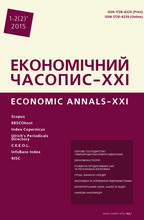Вплив політики кількісного пом’якшення на розвиток світового фондового ринку в умовах глобальної невизначеності
Effect of Quantitative Easing Policy on the World Stock Market under Global Uncertainty
Author(s): Iryna Karpova, Iryna V. Shkodina, Maryna Viktorivna IvashchenkoSubject(s): Economy
Published by: Institute of Society Transformation
Keywords: Stock Market; Volatility; Quantitative Easing; MSCI Indices; Global Economy
Summary/Abstract: Introduction. The current state of the global stock market is characterized by increasing instability of global development. The main reasons of this instability are the disparity of growth between developed and emerging countries, and increasing debt in the public and financial sectors of the countries. Purpose of the article is to determine the dynamics of the global stock market in terms of global uncertainty. Results. Global stock market analysis suggests that the dynamics of various segments of the global stock market does not depend on the economic situation in some countries. It depends on the actions of the central banks (especially the Fed) that are actively pursuing a policy of quantitative easing. However, the main goal of the monetary stimulus is not to grow market share, but to improve the banking system functioning and loans activation. The last factor will lead to an increase in GDP and reduce unemployment. If the main goal is not the quantitative easing achievement, it becomes a superficial measure. In addition, the monetary incentives bring imbalances in the various economic sectors and regions development. We found trends of financial instability increasing in the markets when the Fed of the USA starts raising the interest rates. Conclusion. Desynchronization of the different countries stock markets dynamics indicates strengthening of fluctuations on the global level. This leads to the economic growth weakening and the situation on the stock markets deterioration. The mentioned processes become the major risks in the global economy. As a result, the stock markets and the world economy become very vulnerable to a new crisis. Nevertheless, many investors tend to be very optimistic and continue to ignore the monetary tightening risks. The analysis led us to conclusion that the stock markets and the global economy are extremely vulnerable to a new crisis due to continuous increasing of the speculative bubbles burst probability that has emerged in the markets.
Journal: Економічний часопис - ХХІ
- Issue Year: 148/2015
- Issue No: 01+02 (2)
- Page Range: 4-7
- Page Count: 4
- Language: Ukrainian

